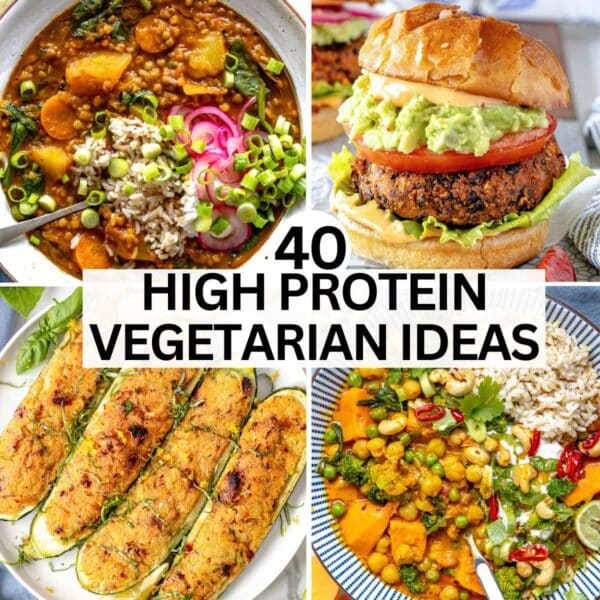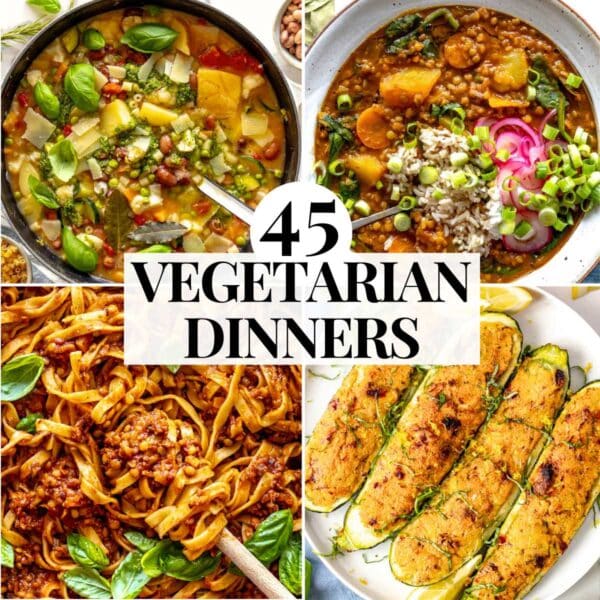Our vegan ricotta cheese is the best alternative to classic ricotta. Its soft, spreadable texture and neutral flavor make it ideal for sweet and savory preparations.
You can make it with soy milk, salt, and vinegar. The recipe is nut-free and gluten-free, but what you will truly love is its versatility.
You can use it as a dip, spread, or pasta sauce. You can use it to stuff ravioli or to crumble on salads. It’s excellent for pies, cakes, and even to fill Sicilian cannoli. This is truly the best vegan ricotta we’ve ever tried.

Table of Contents
Dietary Note: this recipe is suitable for a vegetarian, vegan, and gluten-free diet.
Don’t have time to read the full blog post? JUMP TO RECIPE HERE!
What is Vegan Ricotta?

We’ve been making vegan ricotta for a few years now and used in in dozens of sweet and savory recipes.
From lemon ricotta pasta and creamy kale pasta to stuffed zucchini and tomato galette, you can use this recipe just like you’d use regular ricotta.
Along with our melty vegan cheese, it’s our favorite plant-based, dairy-free cheese because it’s really easy to make, affordable, and goes well with everything.
Most importantly, it’s similar in taste and texture to real ricotta! So much so that you can even use it to make a delicious ricotta pie with chocolate chips and wonderful Sicilian cannoli.

In general, there are two main methods for making vegan ricotta: one with soy milk and the other with blended nuts and tofu.
They are both delicious. However, we recommend you try the soy milk method, which yields ricotta that is ridiculously similar to real Italian ricotta.
Like in actual ricotta making, we use acidity (vinegar) and heat to curdle the protein in soy milk. This method is easy and effective!
So, in this blog post, we will show you how to make the best vegan ricotta with three ingredients: soy milk, salt, and vinegar.
We’ll also show you how to use it in delicious preparations that our readers love!
Check out our variation section below to learn how to make vegan ricotta with nuts, such as cashew nuts or almonds.
Vegan ricotta video
Ingredients & Substitutions for Vegan Ricotta

Quantities are in the recipe box at the bottom of the page.
Soy milk
We tested over 30 different brands of soy milk, and we were able to make ricotta cheese with all of them, even those that contained sugar, flavorings, and additives like calcium or gellan gum.
For best results, pick soy milk with the highest amount of protein or the highest percentage of soy listed in the ingredients.
If you want to use the ricotta to make a savory dish, we choose unsweetened, unflavoured soy milk.
Other types of dairy-free milk, like almond milk or oat milk that you find in supermarkets won’t work because they don’t contain enough protein.
Vinegar
We use vinegar to curdle the soy milk. Use apple cider vinegar or white vinegar.
Lemon juice works, too, but you’ll need more of it.
The optimal amount of vinegar is 40 grams for every 1 Liter of soy milk (or 2.5 tablespoons for 1/4 of a gallon). In comparison, that of lemon is about 60 grams of lemon juice for every 1 Liter of soy milk (or 4 tablespoons for 1/4 of a gallon).
Salt
Salt makes this vegan ricotta taste delicious because it neutralizes the slightly acidic taste of the vinegar.
Add salt even if you want to use this ricotta for sweet preparations.
Equipment
Cloth for filtering liquids
You can use a white, clean, fine-mesh, cotton kitchen cloth like we often do or a cheesecloth or muslin cloth, which you can easily find online for a few bucks.
Make sure your clothes don’t taste like detergent.
Strainer, pot, and bowl
Any strainer will do; it should be large enough to contain the whole milk you are boiling.
You’ll also need a pot to warm the milk and a large bowl to drain excess liquid.
Ricotta cheese mold
It’s optional to give your vegan ricotta the classic ricotta cheese shape. We purchased ours online.

How to Make Vegan Ricotta
US cups + grams measurements in the recipe box at the bottom of the page.
Warm and curdle the soy milk
Add the soy milk to a large pot and bring to a boil, stirring often.

Turn the heat off when the milk boils, and add salt and vinegar.
Stir for 30 seconds to allow the vinegar to mix with the milk.
You should see the milk curdle. When it does, set it aside for 10 minutes.
Tip: Soy milk tends to stick to the bottom of the pot as it heats. To prevent this, stir the milk often with a wooden spoon.

Strain the soy milk
In the meantime, place a strainer over a large bowl/pot and cover it with a clean, fine-mesh cotton kitchen towel or cheesecloth.

Pour the curdled soy milk into the strainer.
Tip: Ensure your clothes are clean and don’t smell like detergent.

Let excess liquid drain for a minute, then wrap the curdled milk in the cloth.
Tip: The milk is hot, so handle it with care.

Press the curdled soy milk
Put a weight on top of the cloth – you can use a bowl filled with beans or water – and let it drain for 15 to 30 minutes, depending on the texture you are after.
Tip: The longer it drains, the firmer it gets. We drain ours for 30 minutes.

After draining, the ricotta is ready for sweet and savory preparations.
Tip: you can use the leftover liquid to make focaccia, pizza, or naan.

Shape the ricotta (optional)
Use a ricotta cheese mold for the best visual results. The ricotta will have the same shape as the one in cheese stores.
Transfer the ricotta to the mold, press it well, then flip the mold upside down onto a plate to get the ricotta out.

How to Eat Vegan Ricotta
Vegan Ricotta as a dip

Transfer the vegan ricotta to a bowl and mix in a pinch of salt, a drizzle of extra virgin olive oil, garlic powder, and fresh or dried herbs like basil, chives, or parsley.
You can stir in a tablespoon of nutritional yeast for a cheesy flavor.
It’s excellent with warm pita bread, crostini, and veggie sticks.
Vegan Ricotta as a Spread

Transfer the vegan ricotta to a bowl and mix in a pinch of salt, a drizzle of extra virgin olive oil, garlic powder, and fresh or dried herbs like basil, chives, or parsley.
Spread in a sandwich, wrap, or toasted bread to make delicious bruschetta appetizers.
You can top it with confit tomatoes, caramelized onions, fresh herbs, olives, marinated artichokes, and sun-dried tomatoes in oil.
Vegan Ricotta with Pasta

You can use vegan ricotta to make delicious and creamy pasta dishes such as:
Vegan Ricotta in Pasta Bakes

Substitute vegan ricotta for regular ricotta in pasta bakes such as:
Vegan Ricotta as Stuffing

Thanks to its creamy but compact texture, vegan ricotta is excellent for stuffing anything from vegetables to pies and pasta. Try it in:
Vegan Ricotta on Salads

Crumble it on salads to add creaminess and protein. Some of our favorites are:
Vegan ricotta for Sweet Preparations

In Italy, ricotta is often used for making delicious sweets. Our reader’s favorites are:
Tips
- Shake the milk package well. Soy tends to settle to the bottom of the package/bottle, where most of the protein we need to make the ricotta hides.
- Boil the milk: the hotter the milk, the easier the ricotta will curdle. So bring it to a boil and try to add salt and vinegar shortly after.
- Don’t let the milk burn: soy milk tends to stick to the bottom of the pot as you bring it to a boil, and it can burn, giving a nasty, burnt taste to the ricotta. To prevent it from sticking, use a double-bottomed pot to heat it and stir it often.
Learnings
Which milk is best to make vegan ricotta?

Over time, we’ve received a lot of questions from our readers, especially about what kind of soy milk to use to make the perfect vegan ricotta cheese.
So, we tested this recipe with most brands of soy milk – 35 to be exact – we could find in supermarkets in our area.

Here’s what we learned
- All soy milk we tested worked well to make vegan ricotta. It didn’t matter if the milk had sugar, vitamins, calcium, flavorings, or other additives.
- Soy milk with a neutral taste, without sugar and flavoring, produces a vegan ricotta with a mild, neutral flavor that is excellent for cooking sweet and savory dishes.
- In general, the higher the amount of soy or protein in the milk (read the label), the higher the yield of ricotta (although this is not always the case). Try to get soy milk with at least 6.5% soy listed in the ingredients or with the highest quantity of protein.
- In conclusion, while all the soy milk we tested worked well to make ricotta cheese when it comes to eating the ricotta, in our opinion, milk without sugar and flavors produces a better, more versatile ricotta cheese.

Variations
Cashew Ricotta Cheese
You’ll need
- 1 cup (160 grams) of raw cashews
- 1/2 cup (120 grams) of water
- 2 tablespoons (30 grams) of lemon juice
- 2 tablespoons (10 grams) of nutritional yeast for a little cheesy flavor
- 1 tablespoon (15 grams) of extra virgin olive oil
- 1/2 teaspoon of garlic powder or onion powder
- 1 teaspoon of salt
- 1 handful of fresh herbs (optional)
Instructions
- Soak the cashews in water overnight or boil them in water for 15 minutes.
- Add all ingredients, including drained cashews, to a high-speed blender or food processor.
- Blend at high speed for 5 to 10 minutes until the cashew ricotta cheese is completely smooth.
- Taste and adjust for salt and lemon juice. You can mix in some finely chopped fresh herbs if you like. Serve or store in the fridge for up to 5 days.

Almond Ricotta Cheese
It has the same ingredients as our cashew ricotta cheese, except that you must replace cashews with peeled almonds.
The instructions to make almond ricotta are the same as for cashew ricotta.
Vegan Tofu Ricotta Recipe
You’ll need
- About 7 ounces (200 grams) of firm tofu or extra firm tofu
- 2 tablespoons (30 grams) of lemon juice
- 2 tablespoons (10 grams) of nutritional yeast
- 1 tablespoon (15 grams) of extra virgin olive oil
- 1/2 teaspoon of garlic powder or onion powder
- 1 teaspoon of salt
- 1 handful of fresh herbs (optional)
Instructions
- Add all ingredients to a blender and blend at high speed for about 5 minutes or until the tofu ricotta is smooth. If you like your ricotta a little thinner, you might need to add a dash of water.
- Taste and adjust for salt and lemon juice. You can mix in some finely chopped fresh herbs if you like. Serve or store in the fridge for up to 5 days.

Questions
No. If you add salt to the hot soy milk, as we explain in the directions, you should not be able to taste the vinegar.
We have not been able to make vegan ricotta with any other store-bought non-dairy milk.
We tried rice, oats, coconut, and almond milk, but only soy worked.
However, you could try making it with homemade almond milk. To do this, you must blend 200g of peeled almonds with 1000g of water in a high-speed blender. Then, you can try curdling it.
Curdling is an ancient technique used to make cheese and tofu. In this recipe, curdling happens when an acid (like lemon juice or vinegar) gets in touch with the proteins in the soy milk at a high temperature.
The change in PH will make the proteins in the milk clump together, resulting in delicious vegan preparations like ricotta and tofu.
Storage & Make Ahead
Make ahead: Vegan ricotta is an excellent meal prep recipe as it stores well in the fridge for days and months in the freezer.
Refrigerator: Store in a covered bowl or airtight container for up to a week.
Freezer: Transfer the vegan ricotta to a freezer-friendly container and freeze it for up to 3 months.
Thaw: defrost in the refrigerator over several hours or overnight. When it freezes and thaws, the ricotta will slightly change in texture. It becomes less compact and a little less spreadable.
More Popular Vegan Recipes
Sauces
Vegan Parmesan Cheese
30-Min Meals
Vegan Cheese (5-Min Nut-Free Recipe)
Sauces
Vegan Mayo
Sauces
Vegan Sour Cream
Sauces
Vegan Ranch Dressing
Tofu
Tofu Egg Salad
30-Min Meals
Vegan Tuna
Desserts
Vegan Custard (Pastry Cream)

Vegan Ricotta Cheese
Equipment
- Clean kitchen cloth cotton with fine-mesh, cheesecloth, or muslin.
- Cheese mold optional, to shape the ricotta.
- Strainer
Ingredients
- 4¼ cups soy milk we recommend unsweetened soy milk to have a ricotta with neutral taste
- 1 teaspoon salt
- 2½ tablespoons apple cider vinegar substitute white vinegar or 4 tablespoons of lemon juice
Instructions
- Add 4¼ cups soy milk to a pot and bring to a boil, stirring often.Turn the heat off as soon as the milk starts boiling, then add 1 teaspoon salt and 2½ tablespoons apple cider vinegar.Stir for 30 seconds or until the soy milk curdles. Set aside for 10 minutes.
- In the meantime, place a strainer over a large bowl/pot and cover it with a clean, fine-mesh cotton kitchen towel or cheesecloth.Pour the curdled soy milk into the strainer.
- Let excess liquid drain for a minute, then wrap the curdled milk in the cloth.Put a weight on top of the cloth – you can use a bowl filled with beans or water – and let it drain for 15 to 30 minutes, depending on the texture you are after.
- After draining, the ricotta is ready for sweet and savory preparations. See the "How to eat vegan ricotta" chapter above for inspiration.
- Optional: To shape the ricotta, transfer it to a cheese mold, press it well, then flip the mold upside down onto a plate to get the ricotta out.
MAKE IT A MEAL
- Transfer the vegan ricotta to a bowl and mix in a pinch of salt, a drizzle of extra virgin olive oil, garlic powder, and fresh or dried herbs like basil, chives, or parsley.You can stir in a tablespoon of nutritional yeast for a cheesy flavor.It’s excellent with warm pita bread, crostini, and veggie sticks.
Notes
Nutrition
If you liked this vegan ricotta recipe, you might also enjoy:




















This is legitimately my favorite thing to make since going vegan 4 1/2 years ago. It is absolutely decadant. If you take an extra step and whip it up in a food processor you get the most silky delicous substitute for cream cheese, etc. but an even milder flavor. Spread on top of a piece of toast, top with blueberries and just a touch of agave and you have a simple, healthy breakfast that tastes like you are cheating on your diet.
My ONLY complaint is that a 1/2 gallon of the soy milk that we can find where I live- USA- only makes about a healthy cup of this so if you are making this for another recipe its a bit time consuming. Worth it though!
Hi Sarah,
What an amazing comment — thank you! I’m so happy this has become a staple for you. Love your toast and blueberry combo too! And yes, yield can be small with some soy milks depending on their protein content, but I’m glad you find it worth the effort.
All the best,
Louise
Could I use this ricotta recipe in Italian Love Cake?
Hi Marilyn,
We haven’t tested this recipe in an Italian love cake, but I assume that it would work. If you give it a try, I am curious to know your opinion. Happy cooking 🥳.
Love this ricotta..the closest by far in method, texture, and flavour, my grandparents use to make ricotta all the time using lemon juice. Using the lemon juice in this recipe makes it tastes so similar. Thank you.
I’m very happy that you enjoyed it, Tanya!! Thanks so much for taking the time to leave a comment here. Kindest,
Louise
I am not vegan, but my niece is and my bestie is pescatarian. This is the easiest and tastiest stuff I have made/used for vegan lasagna. They absolutely love this.
I’ve made this before—thanks for the recipe!
It got me wondering though—do you think this would also work with a soy yogurt, since the protein content is so high? Maybe adding a bit of milk to the pan to get it liquid enough to boil?
Hi Sarah,
We haven’t tried so I don’t know if it would curdle the same way. It’s a good question, though.
If you give it a try, do let us know how it turns out please 💪
Super bună!
Aveti retete adevarate si pline de savoare si gust extraordinar!
Sunt 1 la 1 cu cele clasice
I made soy Greek yogurt and was wondering if I could use this recipe to make ricotta from the whey? Have you tried this?
Hi Nico, I love the soy milk recipe. I have been using Trader Joe’s unsweetened soy milk. It seems to work ok. But I don’t know the percentage of soy. Did you taste that?
I love the soymilk kind so much, I haven’t tried the others! Will have to try the almond one. Kite Hill is super expensive!!!
I tried giving you 5 stars, but the page wouldn’t let me.